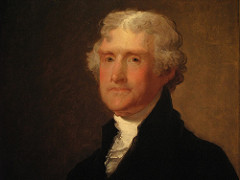Thomas Jefferson on Disagreement and Friendship
In a previous post, I proclaimed that my favorite Founder was Ben Franklin, whose inventiveness, practical wisdom, and skill as diplomat and mediator I especially admire. But I admire many of the other Founders as well, not least because they embodied a constructive approach to disagreement.

Photo by nathanborror 
Take Thomas Jefferson, who once wrote to his friend William Hamilton that “I never considered a difference of opinion in politics, in religion, in philosophy, as cause for withdrawing from a friend.” Jefferson’s attitude is based on an insight to which all too many seem blind these days. In that same letter, Jefferson explains it this way: “he circumstances of our early acquaintance I have ever felt as binding me in morality as well as in affection: and there are so many agreeable points in which we are in perfect unison, that I am at no loss to find a justification of my constant esteem.”
For Jefferson, then, “a difference of opinion” would hardly have justified “withdrawing from a friend”—on Facebook or elsewhere. The bonds of “morality,” “affection”, and “perfect unison” on other “points” were too strong.